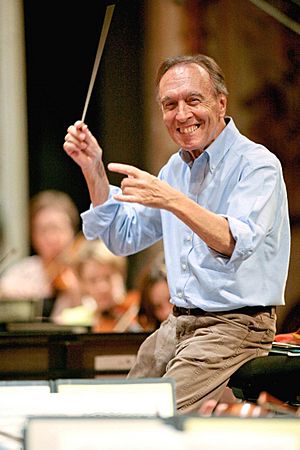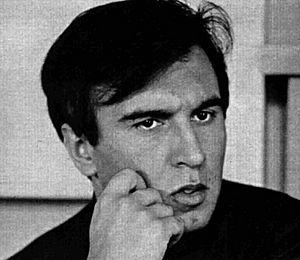Claudio Abbado facts for kids
Quick facts for kids
Senator For Life
Claudio Abbado
|
|
|---|---|

Official government photo
|
|
| Born | 26 June 1933 |
| Died | 20 January 2014 (aged 80) Bologna, Italy
|
| Organization | |
| Relatives |
|
| Senator for life | |
| In office 30 August 2013 – 20 January 2014 |
|
| Appointed by | Giorgio Napolitano |
Claudio Abbado (born 26 June 1933 – died 20 January 2014) was a famous Italian conductor. He was known as one of the best conductors of his time. He led many important orchestras and opera houses around the world. These included the La Scala opera house in Milan, the London Symphony Orchestra, the Vienna State Opera, and the Berlin Philharmonic orchestra. He also started several youth orchestras.
Biography
Early Life and Musical Family
Claudio Abbado was born in Milan, Italy, on 26 June 1933. Music was a big part of his family. His father, Michelangelo Abbado, was a professional violinist and a music professor. He was Claudio's first piano teacher. Claudio's mother, Maria Carmela Savagnone, was also a talented pianist. His brother, Marcello Abbado, became a concert pianist and composer.
Claudio grew up during a difficult time when the Nazis occupied Milan. His mother even went to prison for helping a Jewish child. This made Claudio strongly against fascism. When he was 11, he famously wrote "Viva Bartók" on a wall. This got the attention of the Gestapo, the German secret police, who looked for the person who wrote it. Claudio's love for music grew as he watched famous conductors like Arturo Toscanini lead orchestras. He decided he wanted to be a conductor after hearing a performance led by Antonio Guarnieri.
Education and First Steps
Claudio Abbado studied piano, composition, and conducting at the Milan Conservatory. He graduated in 1955. The next year, he went to the Vienna Academy of Music to study conducting with Hans Swarowsky. While there, he and his friend Zubin Mehta joined the school choir. This allowed them to watch famous conductors like Herbert von Karajan during rehearsals.
In 1958, Abbado conducted his first concert in Trieste. The next summer, he won a big competition for conductors called the Serge Koussevitzky Competition. This led to many chances to conduct operas in Italy. In 1963, he won another award, the Dimitri Mitropoulos Prize. This allowed him to work with the New York Philharmonic orchestra as an assistant to Leonard Bernstein. Abbado made his official debut with the New York Philharmonic in April 1963.
Leading Orchestras and Operas
In 1969, Abbado became the main conductor at La Scala, a very famous opera house in Milan. He later became its music director. During his time there, he made the opera season longer and offered cheaper tickets for students and working-class people. He also introduced new and modern operas to the audience. In 1976, he took the La Scala company to the US for the first time. He stayed with La Scala until 1986.
Abbado also worked a lot with the Vienna Philharmonic orchestra starting in 1971. He even conducted their famous New Year's Day concert twice. He also served as the main guest conductor for the London Symphony Orchestra (LSO) and later became its principal conductor. From 1982 to 1985, he was the main guest conductor for the Chicago Symphony Orchestra. In 1986, he became the music director for the city of Vienna and the Vienna State Opera. He also started a music festival called Wien Modern in 1988, which featured music by modern composers.
Leading the Berlin Philharmonic
Abbado first conducted the Berlin Philharmonic in 1966. In 1989, this famous orchestra chose him to be their chief conductor and artistic director. He took over from Herbert von Karajan. During his time in Berlin, he made sure the orchestra played more modern music. He also helped start a chamber music festival called 'Berlin Encounters' in 1992.
In 2000, Abbado was diagnosed with stomach cancer. This meant he had to cancel some of his concerts. He had surgery and took a break from conducting for three months in 2001. He left the Berlin Philharmonic in 2002 as planned.
In 2004, Abbado returned to conduct the Berlin Philharmonic again. The recording of their performance of Mahler's Symphony No. 6 won important awards. The Berlin Philharmonic also created the Claudio Abbado Kompositionspreis (Claudio Abbado Composition Prize) in his honor.
New Orchestras for Young Musicians
Besides working with established orchestras, Abbado also created new orchestras for younger musicians. In 1978, he founded the European Community Youth Orchestra, which later became the European Union Youth Orchestra (EUYO). In 1988, he started the Gustav Mahler Jugendorchester (Gustav Mahler Youth Orchestra).
Musicians from these youth orchestras went on to form other groups, like the Chamber Orchestra of Europe and the Mahler Chamber Orchestra. Abbado worked regularly with these groups too. In the early 2000s, he and Michael Haefliger started the newest version of the Lucerne Festival Orchestra. This orchestra included musicians from many groups Abbado had worked with. From 2004 until his death, Abbado was the music director of the Orchestra Mozart in Bologna, Italy. He also worked with the Simón Bolívar Symphony Orchestra of Venezuela.
Death
Claudio Abbado passed away from stomach cancer in Bologna, Italy, on 20 January 2014, at the age of 80. A week later, the "Filarmonica della Scala" orchestra played a special tribute to him. They performed a slow, sad movement from Beethoven's Symphony No. 3 in an empty theater. The performance was shown live to a crowd outside the opera house and streamed online. Abbado is buried in Val Fex in Switzerland.
Personal Life
Claudio Abbado had two children, Daniele and Alessandra, from his first marriage. He later had another son, Sebastiano, from his second marriage. He also had a son named Misha Mullov-Abbado with violinist Viktoria Mullova. His nephew, Roberto Abbado, also became a conductor.
Conducting
Music He Performed
Claudio Abbado conducted a wide variety of music, especially Romantic music. He had a special connection with the music of Gustav Mahler, a famous composer whose symphonies he recorded many times. He was also known for his performances of modern music by composers like Arnold Schoenberg and Luigi Nono.
His Conducting Style
Abbado was known for speaking very little during rehearsals. He often just told the orchestras to "Listen." He preferred to communicate with musicians through his body language and his eyes. He felt that orchestras didn't like conductors who talked too much.
Recordings and Awards
Abbado made many recordings for different music labels. His opera recordings won several awards, including the Diapason d'Or de l’Année and the Grand Prix du Disque. He also won Grammy Awards for his recordings, including one in 1997 and another in 2005 for a Beethoven piano concerto with Martha Argerich. In 2012, he was added to the Gramophone Hall of Fame and received a conductor prize from the Royal Philharmonic Society Music Awards.
Honours and Awards
Claudio Abbado received many honors and awards throughout his life:
- Koussevitzky Prize, 1958
- Dimitri Mitropoulos Memorial International Competition, 1963
- Knight Grand Cross of the Order of Merit of the Italian Republic, 1984
- Mahler Medal, 1985
- Grand Cross of the Legion of Honour, 1986
- Ehrenring (Honor ring) from the City of Vienna, 1994
- Ernst von Siemens Music Prize, 1994
- Medal for Meritorious for Culture and Art, 1997
- Knight Commander of the Order of Merit of the Federal Republic of Germany, 2002
- Praemium Imperiale, 2003
- Royal Philharmonic Society Gold Medal, 2003
- Wolff Prize in Arts, 2008
He also received honorary doctorates from several universities, including Cambridge and Havana.
On 30 August 2013, the President of Italy, Giorgio Napolitano, made Abbado a Senator for life in the Italian Senate. This was to honor his amazing cultural achievements.
Videography
- New Year's Eve Concert 1992: Richard Strauss Gala with Martha Argerich, Kathleen Battle, Renée Fleming, Andreas Schmidt, Frederica von Stade and the Berlin Philharmonic Orchestra, Kultur Video DVD, D4209, 2007
- Hearing the Silence (Documentary), Berliner Philharmoniker, Lucerne Festival Orchestra.
- "Beethoven, Symphonies 3 & 9, Berliner Philharmoniker." Euroarts, 2 DVD set. Symphony No. 3 performed by the Accademia Nazionale di Santa Cecelia, Rome, February, 2001. Symphony No. 9 performed by the Berliner Philharmoniker, May, 2000 / August, 2002, in Munich. The DVD of Symphony NO. 3 offers "Conductor Camera" sequences, in which the orchestra's view of the conductor may be selected. Symphony 9 performers include Karita Mattila, soprano; Violetta Urmana, mezzo-soprano; Thomas Moser, tenor; Eike Wilm Schulte, baritone; the Swedish Radio Choir and the Eric Ericson Chamber Choir; Chorus Master, Tönu Kaljuste.
Images for kids
See also
 In Spanish: Claudio Abbado para niños
In Spanish: Claudio Abbado para niños
 | James Van Der Zee |
 | Alma Thomas |
 | Ellis Wilson |
 | Margaret Taylor-Burroughs |



